Kamala Harris' Attorney General Record, In a Nutshell
Her record as attorney general was a point of contention during her first presidential campaign in 2020.
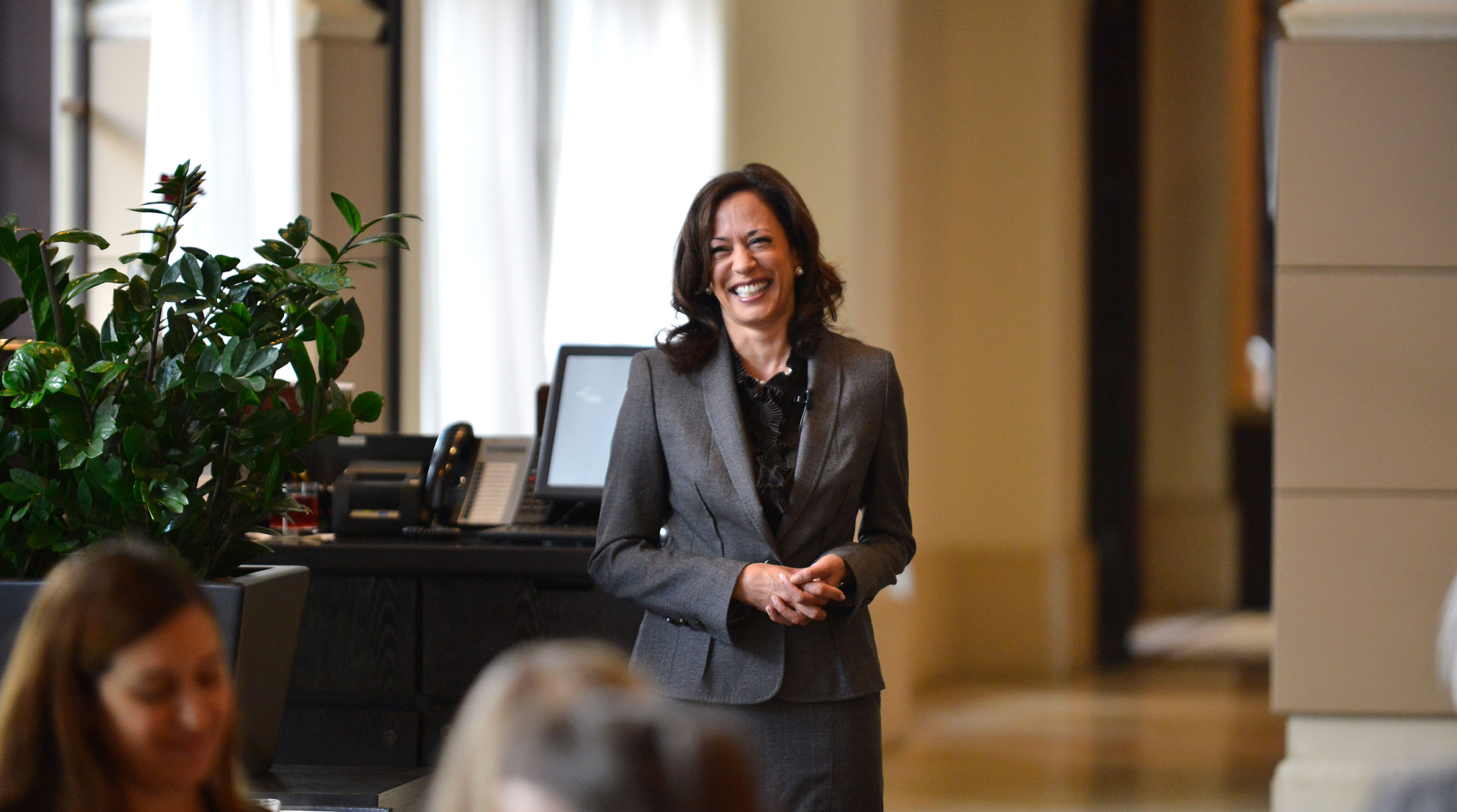
On Sunday, July 21, President Joe Biden withdrew from the 2024 presidential race and endorsed his vice president, Kamala Harris, for president. The first woman, Black person and person of Asian decent to serve as the vice president of the United States, Harris has worn many political hats, from prosecutor to senator all the way to presumptive nominee for president of the United States.
As she seeks the Democratic nomination at the party's upcoming national convention, Harris' history as a prosecutor and attorney general in the state of California is likely to take center stage—after all, it was a touchy subject and cause for concern during her 2020 presidential campaign. When the topic of criminal justice reform arose during the second 2020 Democratic primary debate, Harris bore the brunt of criticism from her fellow candidates.
"The concerns are overblown, yes, no question," Harris told CBS News in 2019, addressing the public and political pushback regarding her career as a criminal prosecutor.
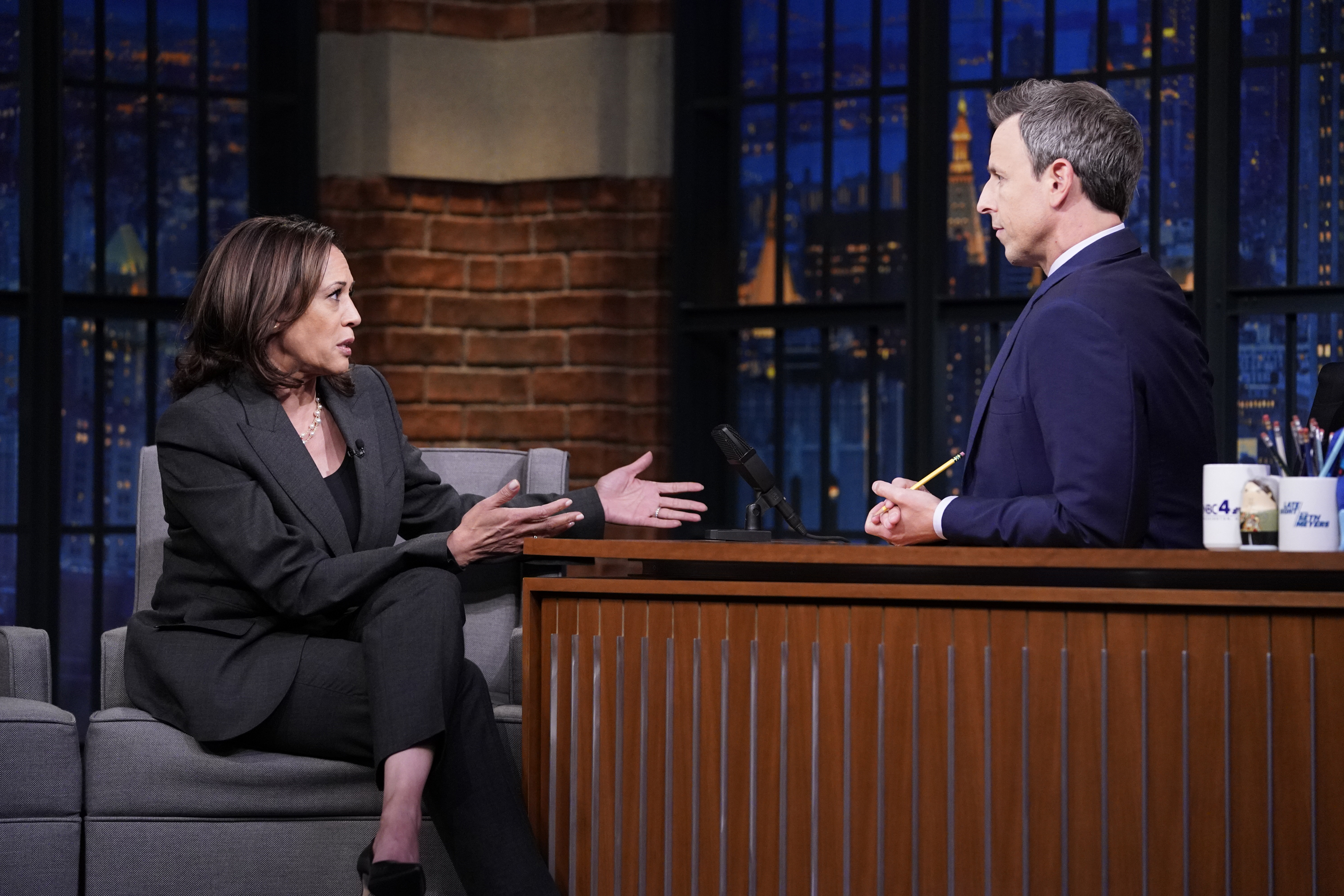
Harris in October 2019 during an appearance on 'Late Night With Seth Meyers.'
On the other hand, reports indicate Harris is now prepared to highlight her time as a prosecutor now that her presumed opponent, former President Donald Trump, is a convicted felon who has also been found legally liable for sexual assault.
“As a former prosecutor, Vice President Harris has a lot of experience holding convicted felons accountable,” Massachusetts Sen. Elizabeth Warren, who has endorsed Harris for president, said, as reported by CNN. “She was fighting on behalf of abused women. She was in the trenches against giant banks. She was out in the middle of multiple fights every day as a prosecutor and then attorney general in California.”
“It’s such a beautiful juxtaposition,” Mini Timmaraju, president of Reproductive Freedom for All said, according to the same report. “Her whole career she’s been taking on tough cases and tough characters like Donald Trump. Her reputation has grown from her success in putting bad guys away. And now she has the chance to put the ultimate bad guy away for good.”

Kamala Harris speaking in Fayetteville, North Carolina.
During a recent campaign stop in Fayetteville, North Carolina when Harris was tasked with defending President Biden's candidacy, she "road-tested some of the lines" she is now expected to use when speaking as a candidate for president facing Trump, according to CNN.
Get exclusive access to fashion and beauty trends, hot-off-the-press celebrity news, and more.
“As many of you know, I am a former prosecutor. So, I say, let’s look at the facts, shall we?” she said at the time, and before going on to compare Biden’s record to Trump’s on a variety of issues.
One of Harris' ads from her 2020 primary campaign has also resurfaced, again drawing a stark comparison between Harris the prosecutor and Trump the criminal.
“She prosecuted sex predators. He is one. She shut down for-profit colleges that swindled Americans. He was a for-profit college—literally,” the ad's narrator says. “He’s owned by the big banks. She’s the attorney general who beat the biggest banks in America and forced them to pay homeowners $18 billion.”
I prosecuted sex predators. Trump is one.I shut down for-profit scam colleges. He ran one.I held big banks accountable. He's owned by them.I'm not just prepared to take on Trump, I'm prepared to beat him. pic.twitter.com/bg4xZ4uLneNovember 20, 2019
As voters dig deeper into Harris' backstory and time as a criminal prosecutor, here's an overview of the vice president's history as attorney general:
Harris served as attorney general twice.
Harris' first go-around was as the district attorney general of San Francisco. Her term lasted seven years, from 2004 to 2011.
Then, from 2011 to 2017, she went on to serve the state of California as attorney general before taking on the role of Senator.
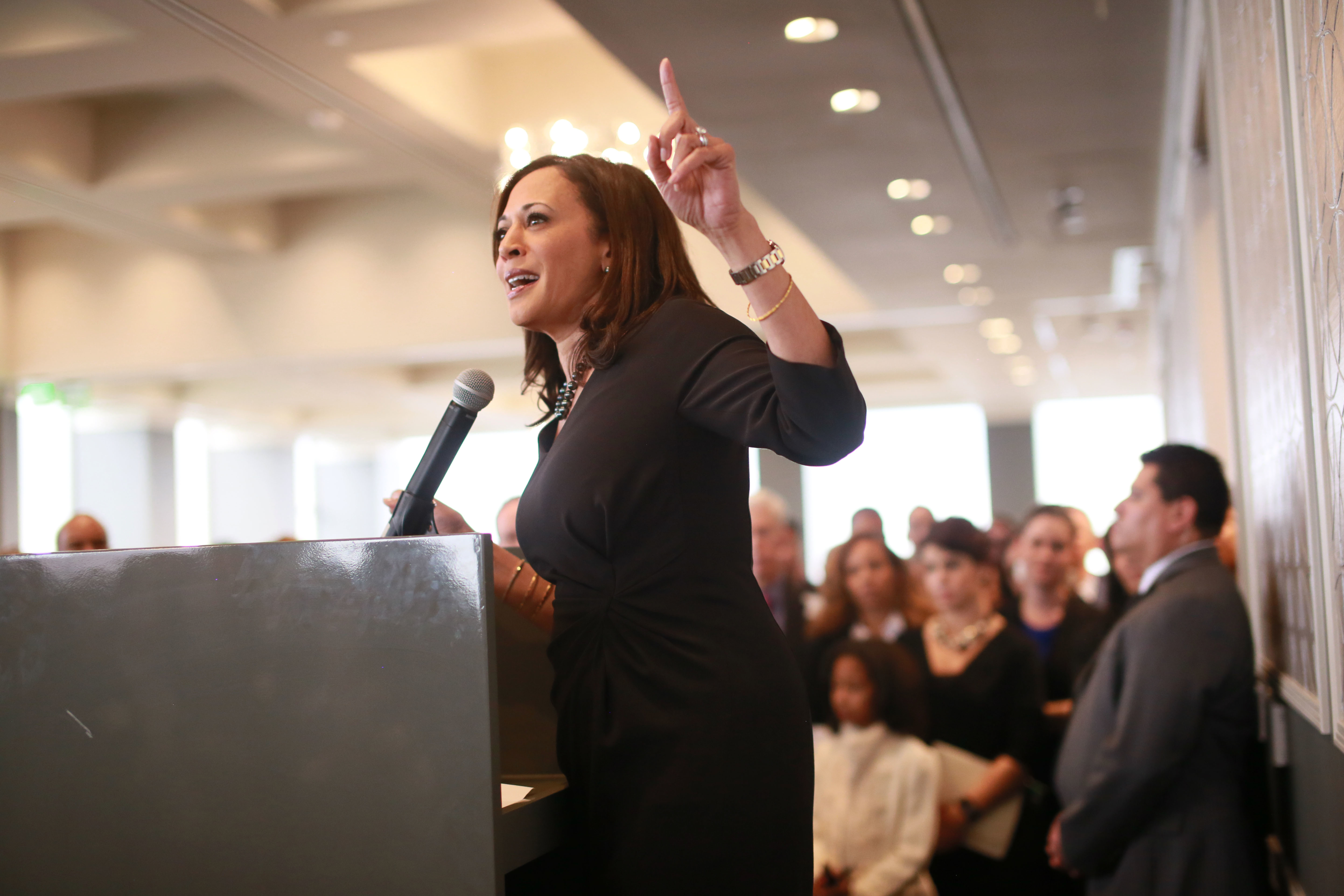
Harris announcing her 2015 bid for attorney general.
al before taking on the role of Senator.
The "Back on Track" initiative was one her most successful programs.
As district attorney in 2005, Harris launched an initiative to reduce recidivism among first-time drug-trafficking defendants. The program, known as "Back on Track", lasts 12-18 months and provides its participants with a personal responsibility plan (PRP).
PRP plans consist of setting goals around employment, parenting, and receiving an education, instead of serving jail time. Participants are also required to serve 220 hours of community service. Graduating from the program requires each participant to find a job, enroll in school full-time, and comply with all terms of their PRP.
“Shutting the revolving door of the criminal justice system requires innovative, results-driven policies and initiatives that help offenders get their lives back on track,” Harris said.
She tackled racial bias and police brutality (kind of).
In 2015, under Harris' jurisdiction as state attorney general, California became the first statewide agency to adopt a body camera program and also enforced a "first of its kind" law enforcement training.
While running for president in 2020, Harris made it a point to remind people of that work during one of the Democratic primary debates and in the wake of the murder of George Floyd.
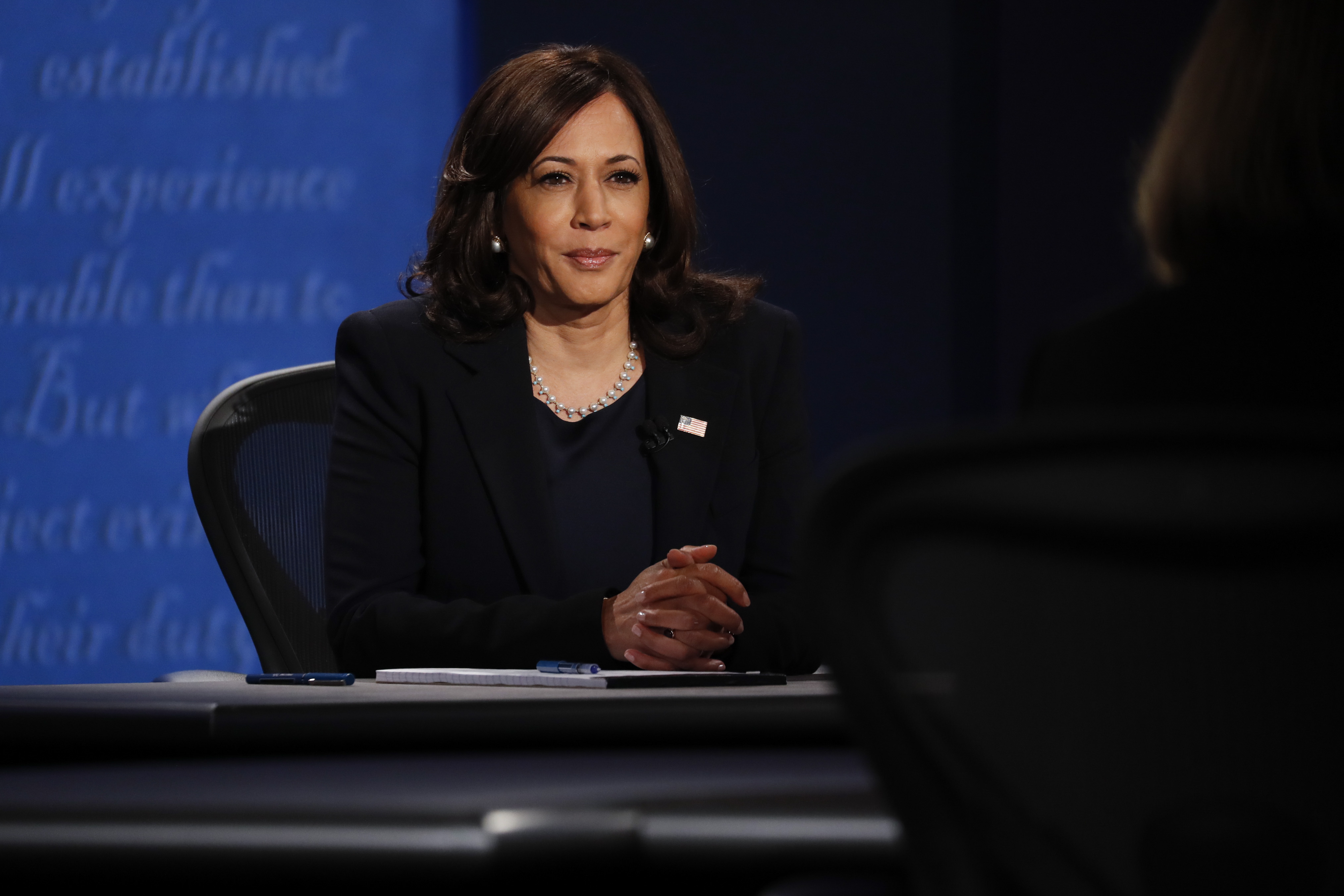
Kamala Harris during the 2020 presidential debate with Mike Pence.
However, wearing body cameras was not mandatory for all local police officers in the state, only those working directly for Harris. According to PBS, that same year Harris warned against a “one-size-fits-all” solution.
“I, as a general matter, believe that we should invest in the ability of law enforcement leaders in specific regions and with their departments to use [their] discretion to figure out what technology they are going to adopt based on needs that they have and resources they have,” Harris told the Sacramento Bee in 2015.
The training Harris referred to is known as "Principled Policing: Procedural Justice and Implicit Bias.” The course totaled eight hours and consisted of "six areas that focus on policing approaches that emphasize respect, listening, neutrality and trust, while recognizing and addressing implicit biases that can be barriers to these approaches," according to a press release from the attorney general's office.
According to the press release, a little over 90 applicants from 30 agencies applied for the course.
Her prison reform past has proven controversial.
In 2011, the Supreme Court demanded the state of California reduce its prison population by 33,000 inmates in the next two years due to overpopulation resulting in starvation, inhumane treatment, and death, according to NPR. Three years later, in 2014, according to the LA Times, federal judges "ordered that all nonviolent second-strike offenders be eligible for parole after serving half their sentence."
At the time, most of those prisoners were working as groundskeepers, janitors, and kitchen staff, according to the same LA Times report. Harris' lawyers argued in court that releasing those workers would drastically reduce their prison labor pool.
However, Harris told BuzzFeed in 2014 that she was "shocked" when she heard about her lawyers' defense. "I was very troubled by what I read. I just need to find out what did we actually say in court," she said at the time.
Her stance on marijuana has evolved.
In 2010, Harris was staunchly opposed to the use of recreational marijuana. “Spending two decades in court rooms, Harris believes that drug selling harms communities,” her then campaign manager Brian Brokaw told Capitol Weekly. "Harris supports the legal use of medicinal marijuana but does not support anything beyond that.”
In 2015, at the California Democrats Convention, she called for an end to the federal ban on medical marijuana, but withheld the term legalization. It wasn't until 2018, as Senator, that she co-signed Senator Corey Booker's Marijuana Justice Act.
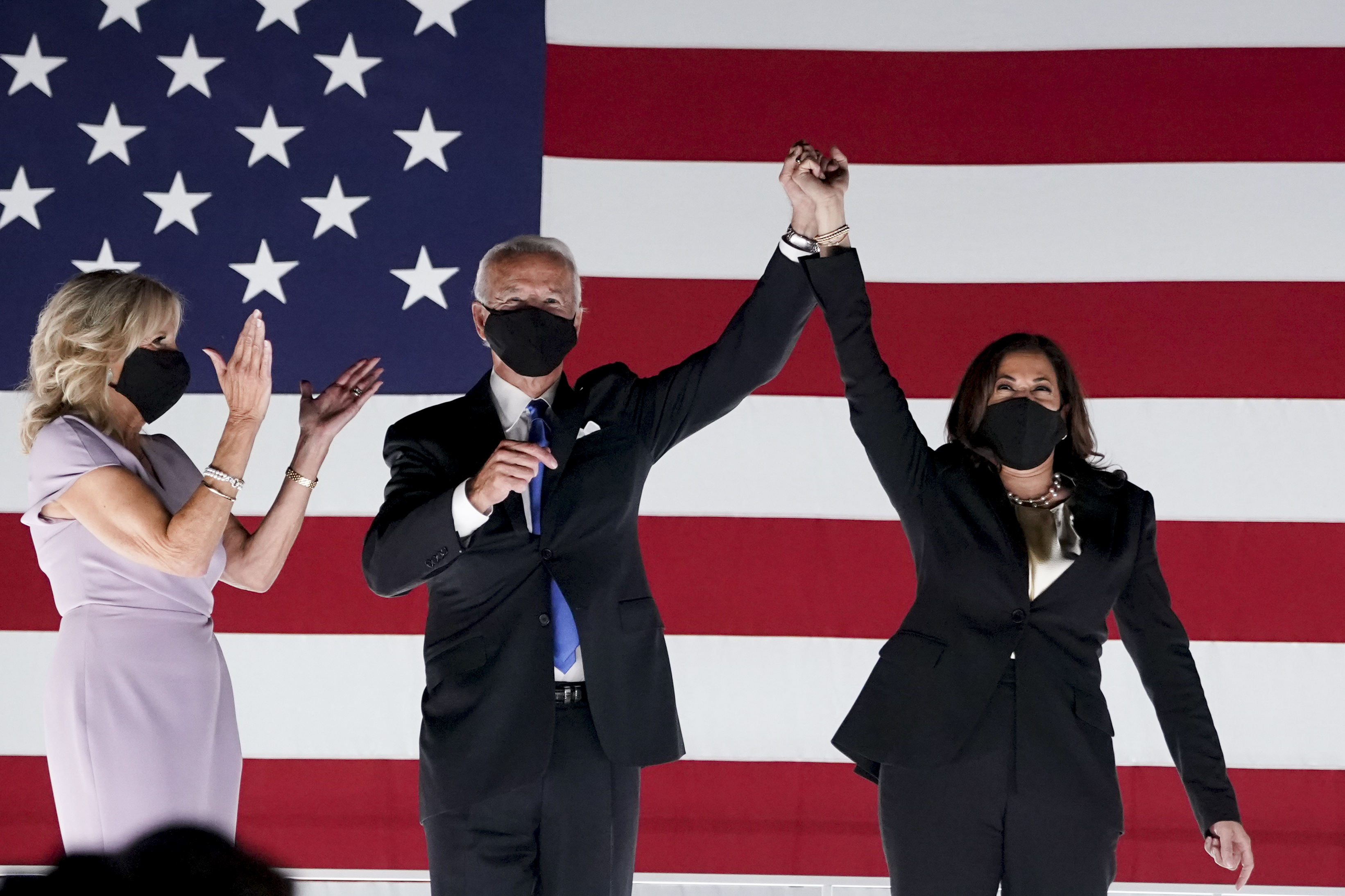
Kamala Harris and Joe Biden in 2020 at the Democratic National Convention.
“Right now in this country people are being arrested, being prosecuted, and end up spending time in jail or prison all because of their use of a drug that otherwise should be considered legal,” Harris said in a press release. “Making marijuana legal at the federal level is the smart thing to do, it’s the right thing to do. I know this as a former prosecutor and I know it as a senator.”
The anti-truancy policy she passed backfired.
In her 2011 inauguration speech, Harris pointed out that in 2010 there were 600,000 truant students in their elementary schools alone. In an effort to remediate this issue, she passed a law making it a criminal misdemeanor for parents to allow their children (kindergarten through eighth grade) to miss more than 10 percent of school days, without an excuse. The parents or guardians of truant children could face a $2,000 fine or up to one year in jail.
“We are putting parents on notice,” Harris said at her 2011 inauguration. “If you fail in your responsibility to your kids, we are going to work to make sure you face the full force and consequences of the law.”
However, this policy ended up generalizing the truancy issue, and is now considered to have heaped blame on parents with circumstances outside their control. Harris has since apologized for criminalizing parents in a Pod Save America interview. "This was never the attention," she said. “I regret that that has happened and the thought that anything I did could have led to that."
Her legislation in regard to sex workers has been controversial.
In 2016, Harris was one of the leaders in the downfall of the classified ads website, Backpage.com. In her filings, she charged the site owners for money laundering, pimping, and conspiracy to commit pimping. A majority of sex workers used the site to find clients who needed an escort and other services, and many considered it to be one of the safest options to vet new clients.
In response to critics who claim Harris cannot adequately advocate for sex workers while also working to dismantle Backpage.com, Harris said she was, in fact, "advocating" for them.
“I was advocating then, that we have to stop arresting these prostitutes and instead go after the johns and the pimps, because we were criminalizing the women,” she said at the time. “[Backpage] was making money off of the sale of youth. So I called for them to be shut down, and I have no regrets about that.”
In 2019, Harris voiced her public support for the movement to decriminalize sex work, which some called a "massive shift."
"There is an ecosystem around that that includes crimes that harm people, and for those issues, I do not believe that anybody who hurts another human being or profits off of their exploitation should be free of criminal prosecution," Harris said in a 2019 interview with The Root. "But when you're talking about consenting adults, we should consider that we can't criminalize consensual behavior."
Alexis Jones is an assistant editor at Women's Health where she writes across several verticals on WomensHealthmag.com, including life, health, sex and love, relationships and fitness, while also contributing to the print magazine. She has a master’s degree in journalism from Syracuse University, lives in Brooklyn, and proudly detests avocados.


